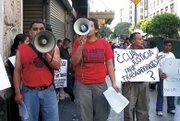Garment Sweeps Turn Day Into Night for Factory Employees
California’s crackdown on unregistered garment manufacturers has had an unintended consequence: The week-long series of raids, which closed 98 garment factories in the state, has turned some apparel workers into night owls.
Many factory workers have complained that their bosses are now forcing them to show up for work after 5 p.m., when most of the day’s garment factory sweeps have been completed, according to workers and workers’ rights organizations.
Others said they are made to work behind closed doors and windows to make it look as if nobody is inside the factories when state inspectors show up. Workers’ rights advocates are saying that instead of making things better, the raids are making things worse.
“Last Thursday [Aug. 4], we were told at 9:30 a.m. to go back to our houses and not return until 5 p.m.,” said Socorro Mandojano, who works at a small apparel factory at San Pedro Street and Washington Boulevard in downtown Los Angeles. Mandojano, who works with 10 to 13 other people, earns about $200 a week cutting thread on the blouses, pants and skirts made at the small factory. “We returned at 5 p.m. and worked until 11 p.m.”
She was told federal immigration officials looking for undocumented workers were conducting the raids, which was untrue.
Mandojano was one of several garment workers at a protest and press conference organized Aug. 8 by the Garment Worker Center, a downtown Los Angeles organization dedicated to protecting garment workers’ rights.
As rush hour traffic and city buses roared by, workers carried signs that in Spanish said: “Where Do the Workers Remain After the Inspections?” and “The Inspections Don’t Improve Anything.”
The protests were in response to the recently formed Economic and Employment Enforcement Coalition, a state coalition that was given $6.5 million in this year’s state budget to crack down on businesses operating illegally in the underground economy. Many of these companies do not have proper business licenses, workers’ compensation insurance, payroll records, or verification that they are paying their workers overtime or the state minimum wage of $6.75 an hour.
The coalition is concentrating on seven industries in California: apparel, agriculture, construction, car washes, janitorial services, racetracks and restaurants. The garment industry was the first to be targeted by the sweeps, which started Aug. 2, exactly 10 years after the El Monte sweatshop raids found 72 Thai nationals being forced to work under lock and key in a garment factory east of downtown Los Angeles. The sweatshop was being run by Thai nationals.
“A lot of workers were telling us that the employers were locking the doors when the coalition was out working,” said Delia Herrera, an organizer with the Garment Worker Center. “They are saying that the raids are being done by immigration to scare the workers.”
Herrera said the investigations are turning workers away from the factories and leaving no employees to interview about working conditions. She also said the workers are working fewer hours and getting paid less money so employers can pay fines.
“To pay the fines, they lower our piece rate by two to three cents a garment,” said Alvino Yevarra, a garment worker who participated in the protest.
Adapting the strategy
Officials from the newly formed coalition said they knew it was not going to be easy to root out bad bosses and labor offenders. That was evident the first day of the sweeps, when several bosses pulled fire alarms to get their workers out of the buildings.
Jose Millan, deputy secretary of the California Labor and Workforce Development Agency and one of the main forces involved in the coalition, said he knew something like this would probably happen. But he said it will not deter the coalition.“The sweeps are doing what we intended them to do, which was to make employers aware that we are out there,” said Millan, who was the lead enforcement officer during the 1995 El Monte sweatshop raids. “The next step is for us to adapt our own investigative strategy to match what these employers are telling workers to do. If they are changing their work hours from 8 o’clock to 5 o’clock to 5 o’clock to 1 o’clock, then that means we have to adjust our inspection schedules to accommodate that.”
Some 135 targeted companies in San Diego, San Bernardino, Orange, Los Angeles and San Francisco were visited during the garment sweeps, which took place Aug. 2–5, Millan said. Of those companies, 98 were closed. There were 723 violations issued for everything from not having workers’ compensation insurance to not paying payroll taxes or minimum wage. The state Department of Labor Standards Enforcement issued $844,750 in penalty assessments. The names of the closed companies will not be released until those businesses have had a chance to appeal the charges.
This is just the beginning. The garment sweeps will continue, according to Millan.
“We have to take a stand,” Millan said. “We have to take action to eliminate those aspects of the underground economy that are injurious to good employers as well as to workers. If good employers find it doesn’t pay to be in compliance, they might as well cut corners and violate the laws like their competitors. It doesn’t take a genius to figure out that pretty soon you are going to have a race to the bottom.”






















